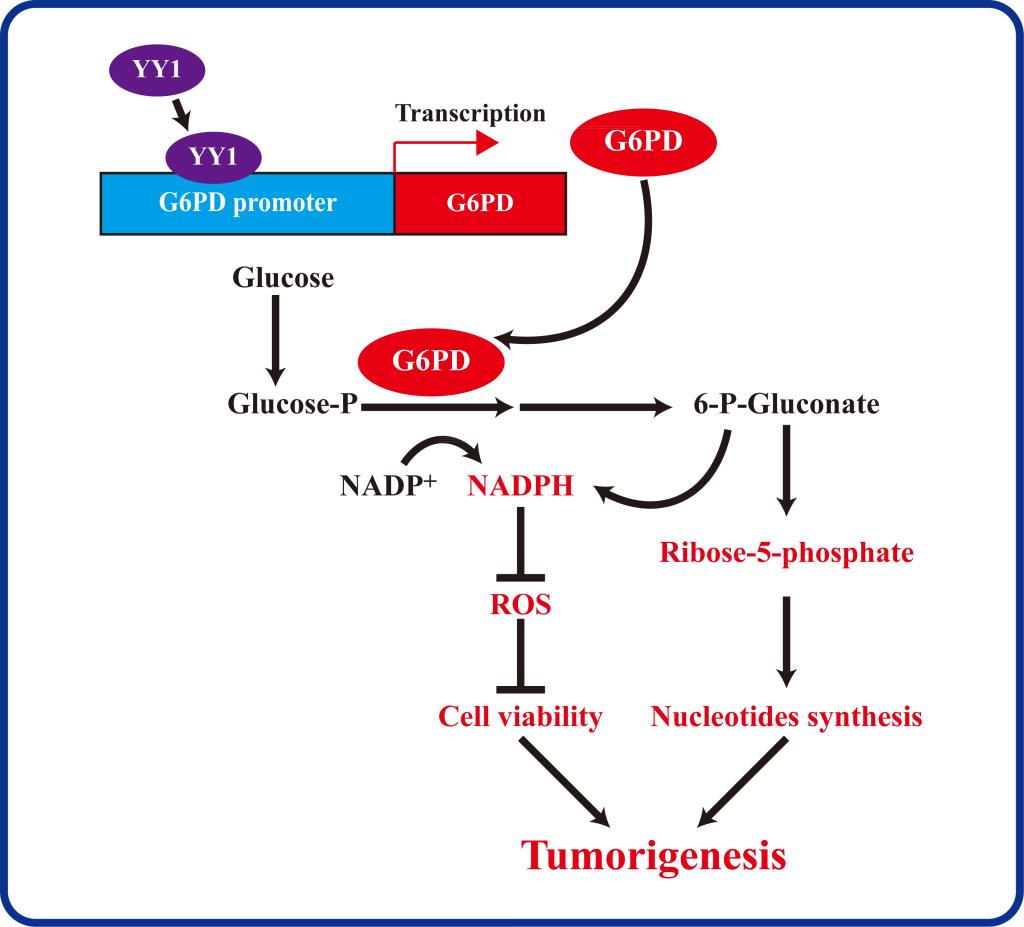Recently, a paper titled Tran ion factor YY1 promotes cell proliferation by directly activating the pentose phosphate pathway has been recently published on Cancer Research (IF: 9.122) of American Association for Cancer Research (AACR). This paper was finished by the research group of the School of Bioengineering led by Associate Professor Wu Shourong and Associate Professor Jiang Qihui and is about cancer metabolism. The paper was published on line on June 19, 2018 (doi:10.1158/0008-5472.CAN-17-4047), with Associate Professor Wu Shourong and Associate Professor Jiang Qihui as the corresponding co-authors of the paper. Postgraduates Wang Huimin, Li Yanjun, Xie Yudan and Huang Can of the School of Bioengineering, and Zhao Hezhao, botanic physician of the Affiliated Cancer Hospital of Chongqing University, have made considerable contributions. Chongqing University is the first implementing organization and the only corresponding organization. This is the second important research paper published by the research group after it published a paper about regulation and control of cancer suppressor gene p53 in Science Advances, a sub-journal of Science in October 2017.
Cancer Research was founded in 1916 and is an international authoritative journal in the cancer research area. It is also one of the international authoritative journals in the medicine area listed in the Nature Index of Nature Publishing Group. Main papers published by the journal include original research papers and review papers on oncology, including fundamental research of cancer, pre-clinical and clinical research, cancer prevention and biotherapy. It has a considerable international influence.

Metabolic reprogramming is one of the key characteristics of cancer cells. Professor Otto Warburg, a Novel Prize winning scientist from
Germany
, discovered in the 1920s that unlike normal cells, which go through mitochondria aerobic metabolism with high efficiency of productivity, cancer cells tend to choose the aerobic glycolysis metabolic pathway. The glycolysis metabolism is extraordinarily active. The aerobic glycolysis metabolic pathway provides energy for cancer cells, and also provides precursors needed for cooperation of biomacromolecules such as nucleic acid, fatty acid and amino acid for cancer cell growth. Subsequent researches have shown that the pentose phosphate pathway PPP in cancer cell was also very active. The metabolic pathway provides reducing and antioxidant substance NADPH for cancer cells and also provides precursors of nucleic acid synthesis for rapid growth of cancer cells. Recent researches have shown that the PPP was closely related to the tolerance of cancer cells and played a very important role in malignant development of cancers.
The research group carried out analysis of clinical sample of colon cancer and found that the famous oncogene Yin Yang 1 (YY1) was in a positive correlation to the expression and activity of the first rate-limiting enzyme G6PD on the PPP. The research group also used methods such as molecular biology, cytobiology and mass spectrometric detection analysis to reveal the acting mechanism of YY1 in regulating and controlling PPP of cancer cells. The group discovered that YY1 could promote expression of G6PD and result in abnormal activity of PPP, and help with production of NADPH, which is extremely important to cell protection, and precursor of nucleic acid synthesis, thus contributing to rapid growth of cancer cells.
The research group also conducted cell and animal experiments and found that G6PD played a key role in inducing growth of cancer cells and formation of cancer. Such findings revealed a new regulation mechanism of the metabolic disturbance of cancer cells, and revealed for the first time the acting mechanism of oncogene YY1 in cancer cell metabolism PPP. This provided a potential target factor for treatment of colon cancer.
The research was funded by the general project (81372202) of National Natural Science Foundation, the youth project of National Natural Science Foundation (31301119) and the general project of the Fundamental and Frontier Research Program of Chongqing (cstc2014jcyjA10058).The Affiliated Cancer Hospital of Chongqing University and National Institute of Advanced Industrial Science and Technology also contributed to the research project.
Click the link to view the paper:
http://cancerres.aacrjournals.org/content/early/2018/06/19/0008-5472.CAN-17-4047
